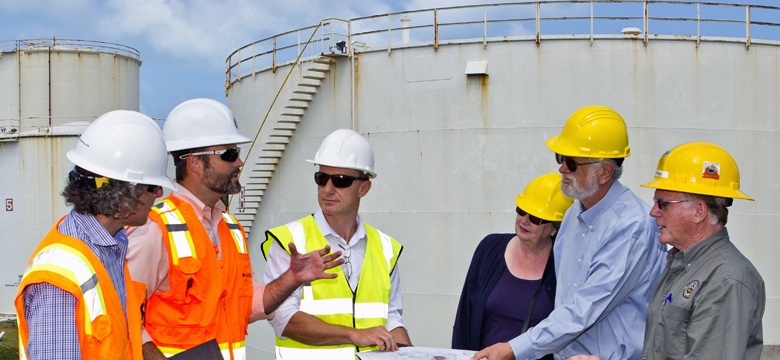
The Department of Environment and Natural Resources (DENR) wishes to update the public on the gasoline spill that occurred at the RUBiS Energy Bermuda Ltd. facility, Ferry Reach on March 27, 2017.
To date (October 2017) the spilled oil floating on the groundwater some 70 feet below the ground surface ('liquid plume') or within the limestone above the groundwater is confined only to the extent of the RUBIS site area.
Some of the more water-soluble components of the gasoline (i.e. dissolved plume), that have leached into the groundwater and are now dissolved within the groundwater, show a slightly larger spread to just outside of the RUBIS site area. However, the concentrations of these gasoline components are well within Bermuda’s standards and are generally demonstrating a downward change in concentration over time as the cleanup continues. As a precautionary measure, one private property nearest to the RUBIS site has been supplied with trucked potable water by RUBIS since the spill to offset the need to use its existing abstraction well for swimming pool and toilet flush water.
The amount of fuel physically removed, largely as vapour over the initial six months of cleanup, has been determined to be approximately 25.5% of the original spilled volume (i.e. 4,385 US Gallons – as of 11th Sept). The estimated amount of gasoline spilled was revised downwards from initial reports of 19,300 US Gallons to 17,200 US Gallons following calculations of the gasoline collected by tanker trucks over the period of the spill and differences in volume due to allowance for respective temperature changes. Bacteria that are naturally present in the ground/groundwater are expected to digest certain components of the gasoline thereby further reducing the volume of gasoline in the ground/groundwater.
The Department can report that RUBIS Energy Bermuda Ltd and their contractors Arcadis US Inc., who are international specialists in contaminated site evaluation and remediation, have been closely following Bermuda’s Risk Based Corrective Action (RBCA) Guidelines. These guidelines address the recovery of the spilled gasoline from the ground, monitoring the extent and level of pollution and reporting the information to the Department at the level of detail and frequency that is stated in the guidelines. The Vapour Extraction System continues to operate 24-hours a day to recover the gasoline vapours from six dedicated extraction wells. The vapour plume monitoring continues with twice daily measurements from 12 on-site wells and daily measurements from two off-site monitoring wells. The groundwater plume is also monitored monthly.
The Department and a consultant to the Government are currently reviewing the latest report from RUBIS, the Comprehensive Site Assessment Report. Further updates on progress will be provided to the public by the Department of Environment and Natural Resources.
